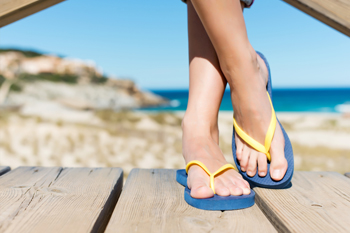 As the summer months approach many people choose to wear flip flops. These types of shoes are easy to slip into and are available in a variety of colors and styles. As popular as they are, they can wreak havoc on the feet and ankles. Many people notice their feet are tired at the end of the day when flip flops are frequently worn. This can be a result of the toes constantly grasping the front of the shoe to keep it secured on the foot. Many types of flip flops have little or no arch support, and this can affect the multitude of muscles and joints in the feet. When wearing these types of shoes it is recommended to wear sandals that support the feet, such as those with straps around the ankles. If you would like additional information about how flip flops can affect the feet or recommendations on the most supportive sandals, it is advised that you seek counsel from a podiatrist.
As the summer months approach many people choose to wear flip flops. These types of shoes are easy to slip into and are available in a variety of colors and styles. As popular as they are, they can wreak havoc on the feet and ankles. Many people notice their feet are tired at the end of the day when flip flops are frequently worn. This can be a result of the toes constantly grasping the front of the shoe to keep it secured on the foot. Many types of flip flops have little or no arch support, and this can affect the multitude of muscles and joints in the feet. When wearing these types of shoes it is recommended to wear sandals that support the feet, such as those with straps around the ankles. If you would like additional information about how flip flops can affect the feet or recommendations on the most supportive sandals, it is advised that you seek counsel from a podiatrist.
Flip-flops can cause a lot of problems for your feet. If you have any concerns about your feet or ankles, contact one of our podiatrists from Sutera and Jones Surgical Podiatry. Our doctors will assist you with all of your foot and ankle needs.
Flip-Flops and Feet
Flip-flops have managed to become a summer essential for a lot of people. While the shoes may be stylish and easy to slip on and off, they can be dangerous to those who wear them too often. These shoes might protect you from fungal infections such as athlete’s foot, but they can also give you foot pain and sprained ankles if you trip while wearing them.
When Are They Okay to Wear?
Flip-flops should only be worn for very short periods of time. They can help protect your feet in places that are crawling with fungi, such as gym locker rooms. Athlete’s foot and plantar warts are two common fungi that flip-flops may help protect your feet against.
Why Are They Bad for My Feet?
These shoes do not offer any arch support, so they are not ideal for everyday use. They also do not provide shock absorption or heel cushioning which can be problematic for your feet. Additionally, you may suffer from glass cuts, puncture wounds, and stubbed toes since they offer little protection for your feet.
More Reasons Why They Are Bad for Your Feet
- They Slow You Down
- May Cause Blisters and Calluses
- Expose Your Feet to Bacteria
If you have any questions, please feel free to contact one of our offices located in Media, Glen Mills, Riddle Memorial Hospital, and Concordville, PA . We offer the newest diagnostic and treatment technologies for all your foot care needs.
